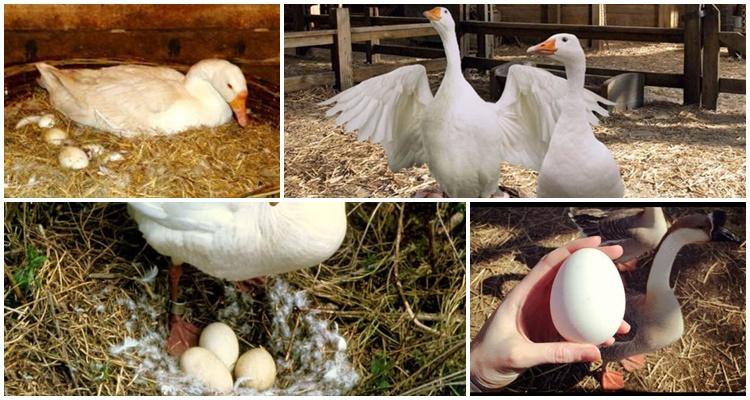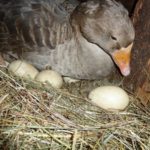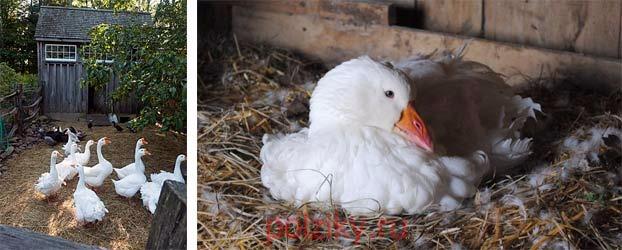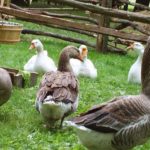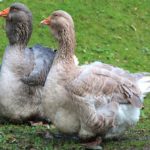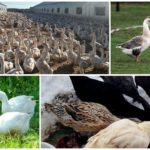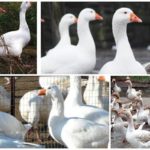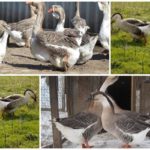Basically, geese are bred for meat. But the eggs of this bird are also popular among farmers due to their dietary properties. Geese have offspring seasonally. Females are usually ready to give birth to young from the first year of life. However, when geese begin to lay eggs is determined not only by the age of the bird, but also by a number of additional factors.
At what age do geese begin to lay eggs?
Puberty in geese occurs at different periods. On average, the first eggs in a bird at home appear in the 8-12th month of life. But there are exceptions to this rule.Representatives of the following breeds are ready to lay eggs faster than others:
- Kuban;
- Chinese;
- Italian;
- Linda.
Representatives of heavy breeds (Toulouse, large gray and others) take longer to mature than others. Moreover, if the flock contains geese and ganders of the same age, then egg-laying often occurs later due to the fact that males develop more slowly.
Females are able to lay eggs without a gander. But in this case, the chicks do not hatch. The first eggs after fertilization appear on the third day. After this, the geese lay eggs every other day for 2-3 months. However, if the female is not allowed to incubate the eggs, laying is suspended for 30-60 months. But at the end of this period, the procedure is resumed.
Eggs must be removed immediately. If the females begin to hatch their offspring, the clutch stops. On average, adult geese remain productive for 6-8 years. But cases have been recorded where females continue to lay eggs for 25-30 years.
How do you know that a goose will soon start laying eggs?
You can determine that a goose is ready to lay eggs by the following signs:
- constantly lowered tail;
- persistent restlessness, the bird rushes around the pen;
- the appearance of an uneven gait (moves, rolling from one side to the other);
- begins to build a nest using its own fluff, grass and straw.
The intensity of the manifestation of these “symptoms” increases as the day of egg laying approaches.
Preparing for the start of egg laying
The productivity of domestic geese directly depends on living conditions. It is recommended to place the poultry house on the south or south-east side of the site. The room must be insulated. The poultry house should be bright, but it is impossible to install many windows, as this will cause the geese to overheat in the summer and overcool in the winter.
For successful oviposition, the following conditions must be recreated:
- indoor air temperature: +20-25 degrees;
- lay a layer of sawdust 5 centimeters thick on the floor;
- allocate one box with nests for each female, covering the bottom and walls with warm cloth;
- nest length - at least 60 centimeters, width and height - 50 centimeters;
- A 10 cm high side is installed in front of the nest, which will prevent the eggs from falling out.
It is also recommended to whitewash the walls, floor and ceiling inside the poultry house and place several containers with sand. A month before the start of laying, the geese should be switched to specialized nutrition, including in the diet:
- hay, greens and cake;
- barley, wheat and oats;
- legumes;
- combined feeds;
- beets, carrots and potatoes;
- fish and bone meal.
Every day the bird should be given up to two grams of salt. During the day, adults are fed 4 times. This approach helps strengthen the bird’s immunity, on which the process of egg formation depends. At the same time, obesity should not be allowed.
Factors influencing timing
The egg production of a bird depends on the following factors:
- breed;
- age (the period from 6 to 12 years is considered the most productive);
- daylight hours and ambient temperature;
- quality and quantity of feed;
- the presence or absence of a grazing area and a reservoir.
The last point is important for representatives of large breeds. Sexual activity in such geese occurs provided that the bird can bathe daily and has constant access to a rich diet.
Why don't geese lay eggs?
If the geese have stopped laying eggs, you need to pay attention to the weight of the bird. Due to obesity, which occurs after 4-6 months, a decrease in the productivity of adults is possible. In this case, it is necessary to adjust the diet. After 6-7 years, productivity decreases due to natural reasons. Also, the absence of eggs is explained by the following reasons:
- course of infectious and other diseases;
- damage to internal organs (including damage caused by large eggs);
- parasitic infections;
- poor nutrition;
- failure to comply with maintenance rules;
- avitaminosis.
Geese stop laying eggs due to extreme stress. This reason for the absence of clutches is more typical for young animals. In summer, adults do not lay eggs due to overheating, in winter - due to hypothermia.
Also, in hot weather, birds should not be intensively fed food rich in protein. In both winter and summer, it is important to ensure a constant supply of vitamins.
In addition, it must be taken into account that the productivity of adult birds directly depends on age. In the first years, the number of eggs hatched is usually less than at 5-6 years of age. This feature is typical for most breeds of geese.

